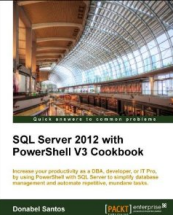Here’s a short PowerShell script that :
1. Connects to your report server
2. Loops through a set of parameters stored in an array
3. Saves the PDF version of the report to a local folder, with appropriate names
Here’s a snippet of code to set your SSRS parameters programmatically using PowerShell
$params = $null; #set parameters #here's a sample usage http://msdn.microsoft.com/en-us/library/microsoft.reporting.winforms.reportparameterinfo(v=vs.80).aspx $params = new-object 'Microsoft.Reporting.WinForms.ReportParameter[]' 3 $params[0] = new-Object Microsoft.Reporting.WinForms.ReportParameter("FISCALYEAR", $fiscalyear, $false); $params[1] = new-Object Microsoft.Reporting.WinForms.ReportParameter("MONTHENDDATE", $monthenddate, $false); $params[2] = new-Object Microsoft.Reporting.WinForms.ReportParameter("SALESGROUP", $salesgroup, $false); $rv.ServerReport.SetParameters($params); |
Of course this is just a sample, you can definitely extend this by using SMO to automatically pull parameter values, or use values stored in a file (among a million other things you can do with ubercool PowerShell)
#============================================================== #PowerShell and SSRS #http://www.sqlmusings.com / http://www.twitter.com/sqlbelle #============================================================== #I am qualifying this because I have more than one version in my system [void] [System.Reflection.Assembly]::Load("Microsoft.ReportViewer.WinForms, ` Version=10.0.0.0, Culture=neutral, ` PublicKeyToken=b03f5f7f11d50a3a") #If you need webforms, use Microsoft.ReportViewer.WebForms #Windows.Forms for viewing [void][System.Reflection.Assembly]::LoadWithPartialName("System.Windows.Forms") #System.Diagnostics because I want to open Acrobat [void][System.Reflection.Assembly]::LoadWithPartialName("System.Diagnostics") $rv = New-Object Microsoft.Reporting.WinForms.ReportViewer; $rv.ProcessingMode = "Remote"; $rv.ServerReport.ReportServerUrl = "http://yourserver.com/ReportServer"; $rv.ServerReport.ReportPath = "/path/to/Financial Report"; #-------------------------------------------------------------- #PDF #-------------------------------------------------------------- #need these variables for PDF rendering #http://www.csharpcourses.com/2008/06/how-to-pass-parameters-to-reporting.html $mimeType = $null; $encoding = $null; $extension = $null; $streamids = $null; $warnings = $null; $salesgroups = @("Red Team", "Blue Team", "Orange Team", "Yellow Team"); $monthname = "September2011"; $monthenddate = "9/30/2011 12:00:00 AM"; $fiscalyear = "2012"; foreach ($salesgroup in $salesgroups) { $params = $null; #set parameters #here's a sample usage http://msdn.microsoft.com/en-us/library/microsoft.reporting.winforms.reportparameterinfo(v=vs.80).aspx $params = new-object 'Microsoft.Reporting.WinForms.ReportParameter[]' 3 $params[0] = new-Object Microsoft.Reporting.WinForms.ReportParameter("FISCALYEAR", $fiscalyear, $false); $params[1] = new-Object Microsoft.Reporting.WinForms.ReportParameter("MONTHENDDATE", $monthenddate, $false); $params[2] = new-Object Microsoft.Reporting.WinForms.ReportParameter("SALESGROUP", $salesgroup, $false); $rv.ServerReport.SetParameters($params); $rv.ProcessingMode = [Microsoft.Reporting.WinForms.ProcessingMode]::Remote; $rv.ShowParameterPrompts = $false; $rv.ServerReport.Refresh(); $bytes = $null; $bytes = $rv.ServerReport.Render("PDF", $null, [ref] $mimeType, [ref] $encoding, [ref] $extension, [ref] $streamids, [ref] $warnings); $file = "C:FinancialGroupFinancial_" + $salesgroup + "_" + $monthname + ".pdf"; $fileStream = New-Object System.IO.FileStream($file2, [System.IO.FileMode]::OpenOrCreate); $fileStream.Write($bytes, 0, $bytes.Length); $fileStream.Close(); #if you want to open the PDF automatically, can uncomment the following # [System.Diagnostics.Process]::Start($file); } |
Enjoy!
Download SSRS Parameterized Reports in PDF with PowerShell,







